
Parents believe two-child limit can negatively affect their children’s early development
Severe financial pressures on families affected by the two-child limit may be affecting their children’s early development before they start school, according to a study.
11 September 2024
Share this page
Affected parents experiencing hardship who took part in research, being presented at the BPS Developmental Psychology Section conference this week, believe their children are missing out on opportunities to learn and play because of lack of money, and that this could limit their long-term life chances.
Families affected by the two-child limit (2CL), which restricts support through the child element of universal credit (UC) or child tax credit to the first two children in a family, are thought to be around £3,000 per child a year worse off as a result.
Simran Motiani, an analyst for the fairer start mission at Nesta, the UK innovation agency for social good and one of the study authors, said parents viewed the two-child limit as 'unfair, punishing and a hindrance to children's early development'.
"The parents we spoke to felt their younger children missed out on enriching early life experiences compared with older siblings at the same age.
"One mother impacted by the 2CL told us how she had noticed differences in her older and younger children's social and emotional development, and she put this down to her younger children's limited access to certain learning opportunities."
Specifically, the study found, younger children affected by the 2CL were said to have less access to formal education and learning resources, such as books and toys; fewer opportunities to take part in enrichment activities such as educational trips; and fewer opportunities to socialise with peers.
Louise Bazalgette, deputy director of the fairer start mission at Nesta and another study author, added that parents experienced stress, worry and poor mental health.
"Parents felt demoralised, guilty and exhausted due to financial pressures. Some of the parents we interviewed were very concerned that their current financial challenges could be shaping their young children's lives in ways that could go on to limit their long-term life chances."
The authors believe presenting at the BPS Developmental Psychology Section conference offers 'an invaluable opportunity' to share their research.
"It allows us to connect with a community of developmental experts, share insights, and gain feedback that can deepen our understanding of the relationship between economic disadvantage and child development," Simran Motiani said.
"We hope the conference will open doors for future collaborations that can drive evidence-based change to better support children's early development."
Thirty-five parents in England took part in the qualitative study, published in April, which is part of wider research exploring the impact of the 2CL on children's early developmental outcomes, by comparing children who are and are not affected by the limit.
The Institute for Fiscal Studies will now carry out quantitative analysis of data to investigate whether there is evidence of a link between children being affected by the 2CL and poorer outcomes at age five.